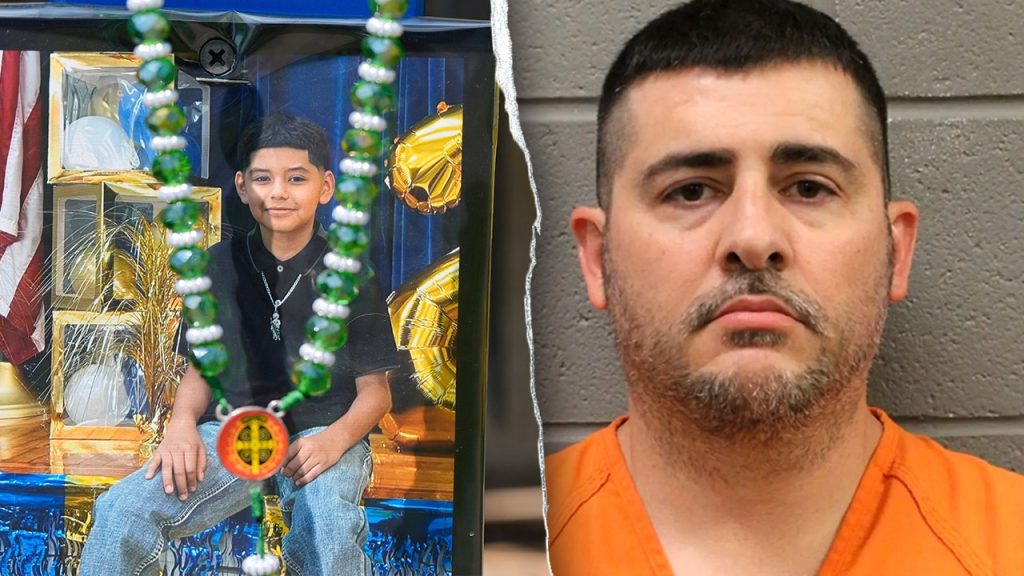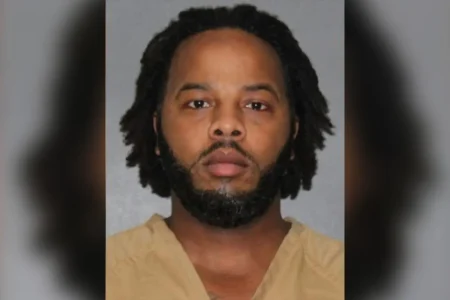A Tragic Response to a Childhood Prank: Houston Man Charged with Murder of 11-Year-Old
In a devastating turn of events that has shocked a Houston community, 42-year-old Gonzalo Leon Jr. faces murder charges after allegedly shooting and killing 11-year-old Julian Guzman following a harmless childhood prank. The incident occurred on Saturday when young Julian, participating in the age-old “ding-dong ditch” game, rang several doorbells in the neighborhood before running away. What should have been an innocent childhood mischief ended in unimaginable tragedy when, according to authorities, Leon allegedly shot Julian as the boy was fleeing. Despite immediate medical attention, Julian succumbed to his injuries the following day, leaving his family and community in mourning and raising profound questions about gun violence, appropriate responses to perceived nuisances, and the safety of children in our neighborhoods.
The sequence of events, as described by local officials, paints a heartbreaking picture of overreaction with fatal consequences. Witnesses reported seeing Julian running from a house after ringing a doorbell when the shooting occurred. Initially, Leon was detained at the scene but released, only to be arrested later by the Houston Police Department’s SWAT team on Tuesday and subsequently booked into Harris County Jail. The delay between the incident and the arrest has raised questions within the community, though authorities appear to have gathered sufficient evidence to proceed with murder charges. Houston Police Department Sergeant Michael Cass was clear in his assessment of the situation, stating, “In my opinion, it doesn’t look like any type of self-defense. It wasn’t close to the house, so it’ll more than likely be a murder charge,” eliminating potential justification for the shooting.
This heartbreaking incident has resonated deeply within the Houston community, sparking conversations about proportional responses and the sanctity of childhood play. “Ding-dong ditch,” known by various names across generations, has long been a relatively harmless, if occasionally annoying, childhood game. The fundamental disconnect between the trivial nature of the prank and the lethal response it triggered has left many community members grappling with disbelief and sorrow. Julian’s death represents not just the loss of a young life but also raises uncomfortable questions about how we as a society value children’s safety and innocence. Parents in the neighborhood now face difficult conversations with their own children about both the tragedy itself and the boundaries of play in a world where such innocent activities can apparently trigger deadly consequences.
The case bears disturbing similarities to another recent incident in Frisco, Texas, where 58-year-old Damon Wolfe allegedly shot at a group of teenagers who were also playing “ding-dong ditch” on July 28. While fortunately no fatalities occurred in that incident, Wolfe faces three counts of aggravated assault. These parallel cases point to a troubling pattern of disproportionate and potentially deadly responses to minor annoyances, raising serious concerns about gun ownership responsibility and conflict resolution in residential communities. The proximity of these incidents in both time and geography has amplified concerns about whether similar mindsets might be prevalent elsewhere, causing parents and community leaders to consider how best to protect children while still allowing them the freedom to engage in traditional childhood activities.
From a legal perspective, both cases highlight the complex intersection of property rights, self-defense laws, and appropriate use of force. While homeowners have legitimate rights to protect their property and safety, legal experts emphasize that these rights are not unlimited and must be exercised with reasonable judgment and proportionality. The apparent absence of any imminent threat to Leon—as suggested by police comments that the shooting occurred away from the house and while the child was fleeing—undermines potential self-defense claims. The charges brought against Leon reflect the justice system’s recognition that the response far exceeded any reasonable reaction to the situation. As the case proceeds through the legal system, it will likely become an important reference point in discussions about the limits of defensive actions and the legal consequences of excessive responses to non-threatening situations.
Beyond the immediate tragedy and legal proceedings, Julian Guzman’s death invites broader societal reflection on community safety, gun violence, and the protection of childhood innocence. The contrast between an 11-year-old boy engaged in playful mischief and the deadly violence that ended his life encapsulates multiple social issues that communities across America continue to wrestle with. While the legal system will address the individual accountability in this specific case, preventing similar tragedies requires deeper community engagement, improved conflict resolution skills, and thoughtful consideration of how we balance personal security concerns with maintaining neighborhoods where children can safely play and grow. As Julian’s family mourns an unimaginable loss, their grief serves as a sobering reminder of how quickly life can be shattered and how essential it is for communities to prioritize measured responses, open communication, and the safeguarding of our most vulnerable members—our children.







